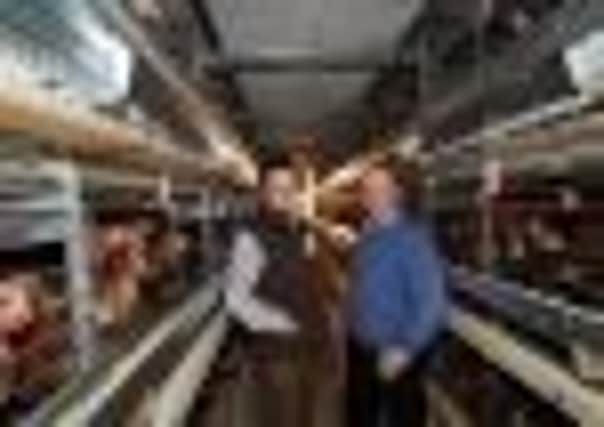Farm Of The Week: Success of putting all the eggs in one basket


The farm has 300 acres of wheat and a hundred thousand chickens, all of them housed in the new type of ‘enriched colony’ cages required by European law from January 1. The wheat is the only crop grown on the farm, and it never leaves the site.
“That’s all consumed by the poultry,” Martin Morrison says. “Basically, what’s subsidising the chickens.”
Advertisement
Hide AdAdvertisement
Hide AdThe entire crop goes into the chickens and their droppings go back into the ground and this helps the farm grow just wheat, without other crops being used as a part of a rotation.
“We find that once we’ve got past the third year, it makes very little difference,” Martin says.
“Because of the poultry manure we can grow continuous wheat,” his son Ken chips in.
“It’s all incorporated after the harvest, into the ground,” says his father. “Then the new crop’s sowed into it. We plough some and we ‘minimal-cultivate’ some of the other areas.”
Advertisement
Hide AdAdvertisement
Hide AdThe soil is medium to heavy clay. Three newly constructed sheds house the hens using the enriched colony system. The Morrisons decided to make the switch from old-style battery cages four years ago.
“It has a lower stocking density,” says Ken, “and it’s called ‘furnished’ – there are perches inside the cage, scratching areas and nest boxes.”
“It’s to make the bird environment more suited to natural behaviour,” adds his father.
The Morrisons have increased the number of hens on the farm. Before the new cages were built they had around 35,000, a third of what they have today.
Advertisement
Hide AdAdvertisement
Hide Ad“We did it on the premise that a number of local producers felt they were unable to continue in the business,” Martin Morrison says. “There are numerous people who have gone out of the business and we have picked up the slack.”
Ken Morrison says it wasn’t a big decision for them to make because he wanted to follow in the footsteps of his father, and grandfather. Martin Morrison says the cost of the capital investment in the new sheds and cages equates to around £20 a bird.
As well as the cages themselves, a great deal of hi-tech gadgetry has gone into the new sheds. The eggs, when they are laid, fall gently onto a conveyor belt and are then transported from all three sheds to a packing area where they are put into boxes for customers.
The hens are a breed called Bovans Brown, originally from the Netherlands.
Advertisement
Hide AdAdvertisement
Hide Ad“It’s a hybrid laying bird that suits our system,” says Ken. “We find it’s a more consistent shell quality at the end of the lay.”
The hens come to the farm at the age of 17 weeks and stay laying for 14 or 15 months. Then they are sent to be processed, usually for soups, pies or spreads.
Despite having the confidence to invest in the future, both Martin Morrison and his son feel angry with the government that the new rules on cages are not being comprehensively applied to eggs coming into the country, despite some EU members having conspicuously failed to meet the deadline.
“It’s a bit annoying to say the very least,” says Martin. “We’ve invested quite heavily in the new facilities to comply with the regulations, as we were told they were going to be enacted, and then politicians duck their responsibilities.”
Advertisement
Hide AdAdvertisement
Hide AdThis is a reference to the announcement the UK will not actually ban the sale of imported eggs suspected of being produced in illegal battery cages, although it has organised a voluntary agreement by retailers to try to avoid them.
“People within the industry feel very let down,” Martin says.
Nevertheless Ken Morrison, who represents the next generation, is optimistic for the future.
“Because there’s only so much land area in the world to feed so many people, food’s going to get more expensive.
“I think the future could be quite good.”